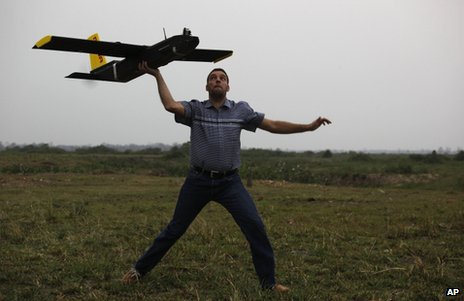An open letter to Eric Schmidt about banning private drones

Eric Schmidt recently expressed the view that the government should restrict the use of unmanned vehicles to individuals because of possible security and privacy issues. “Imagine that you have a disagreement with your neighbor. What do you say, if a neighbor goes and buys a drone for video surveillance of your house - and will launch it from your lawn. The drone will fly over your house every day. How will you feel? ”
Small UAVs with video cameras have already gone on sale. According to Schmidt, the state should impose a restriction on their use also because of the threat of terrorism.
Erik Schmidt's statement was embarrassed by activists of model aircraft clubs and robotics fans. Members of the DC Area Drone User Group have published an open letter to Eric Schmidt with a convincing explanation of why private drones should be given complete freedom. In short, it is a technology with a potential for explosive growth that can revolutionize the world. “Flying robots in personal property today can change the balance of power between people and a big bureaucratic machine in much the same way as the Internet did in the past,” the open letter said.
')
Full text
As your associates in the idea of transforming the power of technology, we at the Drone DC Group User Area were surprised and saddened to read your latest comments calling for greater restrictions on the use of small drones. It is especially surprising that such words are heard from the Chairman of the Board of Directors of Google in the light of the remarkable support your organization provides to the World Wildlife Fund in combating poaching through the use of drones and the Matternet project to deliver drugs to African people using unmanned vehicles.
Ironically, now because of the limitations of the FAA, personal drones are better suited for solving socially important tasks in the US than government or company-owned drones. Our group is now implementing a video surveillance system overlay project to help the local park track plant and animal species in the park. The park itself as a legal entity now has no right to launch its drones without going through the licensing process in the FAA, in practice, too complicated and expensive for a small government organization. It is also illegal for them to hire a contractor to do this work, since the rules currently prohibit the commercial use of unmanned aircraft systems. However, it is completely legal for individuals to use their own drones on a voluntary basis to help the park.
You believe that terrorists can use drones for nefarious purposes. However, such technologies have been available for many years. Radio-controlled military aircraft, ground vehicles and ships have existed for decades, and people equipped them with cameras and other useful tools. And just because the terrorists today use Gmail for communication, as they used to use phones, does not mean that the world would be better if we restricted the use of email and telecommunications technologies, allowing them only to the government and large businesses. Do you believe that any new technology should be suppressed, because it can be used against society? The answer to these challenges is the prohibition of terrorism, murder, theft, and invasion of privacy, which has already been done. Restricting access to certain technologies is always a losing option, because attackers will simply find new tools for harming.
What your comments demonstrate is a tendency that is notoriously widespread in our society, when some people are afraid to provide universal access to tools that in the past were the exclusive prerogative of the government and large corporations. As drones become cheaper, more compact and easier to use, we see that ordinary citizens and public organizations can independently cope with the tasks in which they previously had to rely on others. Farmers can check the condition of their own crops from the sky without paying for the expensive services of manned aircraft. Environmental societies can assess natural resources without having to buy expensive satellite imagery.
Flying robots in personal property today can change the balance of power between people and a large bureaucratic machine, as the Internet has done in the past. And just like military researchers who developed GPS to send ammunition, they could never imagine that their technology would be used in the future to help conduct medical research in the poorest countries of the world or to help find partners for love in richer countries , there is a huge variety of socially important, useful and simple applications for UAVs, which we have yet to open. We must seize this chance, and not crush the opportunity in the bud. We hope that you and other Google executives will accept this technologically sound agenda in the future, and not try to strangle it. We would gladly agree to discuss this topic with you in more detail.
Timothy Reuter
President and Founder
DC Area Drone User Group
http://www.dcdrone.org
Source: https://habr.com/ru/post/178097/
All Articles